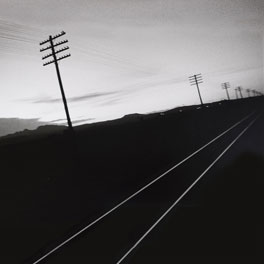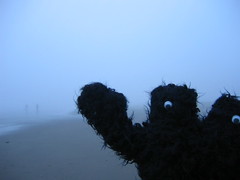Great post, Dan Phelps.
MoreSpaceEcho wrote:lemme ax you guys this: how do you go about changing up your normal shit?
I've found, initially with graphic design which I went to school for, but now just as much or moreso with music that sometimes the best, or at the very least good, interesting results can come from taking two things that don't traditionally fit together and working out how to get them to work together. Strange example from the design world, I had a typeface design client who wanted a font that was "alien meets zombie" (clearly not designing the next Helvetica, but it was a serious project nonetheless). I spent time thinking about and researching the connotations of each, and found that "alien" tends to connote clean, futuristic, digital, geometric shapes, while "zombie" brings to mind decay, words being scratched, etc. Both have their own postures to them, and working out how to bring two things that are essentially opposites (even if they are both horror movie themes) together. Sometimes the place your creative stamp comes out is not in coming up with some totally new idea but in finding a solution to a problem.
Specifically in response to creating drum parts, I didn't originally start out as a drummer, and my first experience with creating drum parts was creating patterns with fake drums. It was a good experience to be looking at patterns that are used over and over completely separately from playing them, as I wasn't a drummer at that point. I started putting something intentionally kind of strange in, and that's ended up being something that has afforded me some praise as a drummer. With one song on my last album (called Down River, the album's in my signature) I wanted to find a way to kind of have the main beat include toms, thinking "why do toms have to be confined to fills?". Another song, Pillarsaint, I was sick when originally writing it (which definitely influenced the song), and with the drumming I was playing with going between playing all syncopated accents and playing somewhat straight.
For a few months I've been drumming for a past client turned good friend Christian Bitto (
http://christianbitto.bandcamp.com). He does the guitar, bass, and vocals on his recordings while I supply the drums. It's been a good chance to place with drumming ideas, and he's always been pleased with my sometimes unusual choices. One song on his EP is completely cliche, exactly what would be expected for a folk rockish song. Another one, the idea was originally influenced by an Elliot Smith song and a discussion about how the drum part almost bordered on a hip hop beat. For that song, I took that idea and the idea of a straight drum machine and stretched it into having no fills whatsoever in the song, no cymbals other than straight high hat. It was a lesson in restraint and I love it for it. In one way you listen and since the drums aren't changing they fade into the background, but in another sense if you're listening and waiting for a fill it's a suspenseful situation. One more song that'll be going on his next album, I'm doing one long cymbal roll through literally the entire song, staying low in the verses, bigger in the choruses with sparse tom hits, the next chorus adds kick/snare while keeping the cymbal roll going. Only in the climax of the song does it break into a different type of beat, and when that part is over it comes right back into the cymbal roll.
Clearly I like to get a little strange with some things and of course it won't fit with everything, but I try to never just go with what's totally expected unless it's music that has that as the intention.



